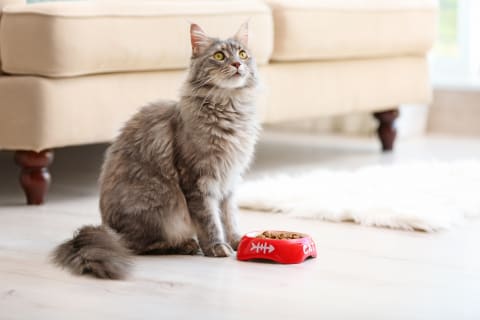Why is my cat refusing to eat?
There are many reasons why cats refuse to eat. They may dislike their new food, or be in pain or feeling uncomfortable. Identifying your cat’s specific reason for not eating can be a frustrating experience.
If your furry feline companion skips one or two meals but then returns to eating normally, you likely don’t have reason to worry. However, if your kitten or cat ceases eating for more than a day, he or she may have an underlying health issue that should be looked into.
Less Serious Reasons Why Your Cat May Not Be Eating
These are some less serious reasons why your cat’s appetite may have decreased:
- Stranger in the house
- New food
- Change in regular routine
- Recent vaccinations
- Motion sickness after travel
If any of the above apply to your cat’s situation, you’ll likely notice that your cat starts to eat again within 24 hours, and will gradually return to normal. However, if your kitty refuses to eat for more than a day, it may be wise to schedule an appointment with your vet. When considering your pet’s health, it’s always better to be cautious.
More Serious Reasons Why Your Cat May Not Be Eating
Whether the issue is with your pet’s internal systems, dental health or something else, our Flat Rock vets can perform tests to diagnose the problem and develop a custom treatment plan for your cat or dog.
Dental Health Issues
Like people, cats can suffer from tooth decay and various mouth infections. Your cat may be refusing to eat due to pain caused by advanced tooth decay, inflamed gums, broken or loose teeth, a dental abscess, or an injury to the inside of their mouth caused by a foreign object.
If you believe that your cat is suffering from mouth pain it's time to call the vet. Your vet can clean your cat's teeth and do a thorough examination of your cat's mouth to check for any oral health problems.
Gastrointestinal Issues
Common gastrointestinal (GI) problems in cats include: parasites, foreign objects trapped in the intestinal tract, gastroenteritis, pancreatitis, urinary obstruction, colitis, cancer or changes in gut intestinal bacteria.
GI issues can cause cats to feel nauseous and experience a lack of appetite. If your cat is suffering from a gastrointestinal issue they may show other symptoms such as weight loss, vomiting, constipation, or diarrhea.
If your cat is showing signs of a GI issue, it's time to see your vet. Gastrointestinal problems such as those listed above are serious and may require emergency care, early diagnosis and treatment are key.
Kidney Disease
Much like gastrointestinal issues, kidney disease can make cats feel nauseous and refuse to eat. If your cat is suffering from kidney disease you may notice other symptoms such as drinking large amounts of water and frequent urination. Kidney disease is relatively common in cats over seven years of age.
Kidney disease can only be diagnosed and treated by your vet. If your cat has stopped eating and is showing other symptoms of kidney disease contact your Southeast Memphis vet to book an appointment.
Note: The advice provided in this post is intended for informational purposes and does not constitute medical advice regarding pets. For an accurate diagnosis of your pet's condition, please make an appointment with your vet.
Is your cat’s lack of appetite causing you concern? Contact our Flat Rock vets at Western Carolina Regional Animal Hospital & Veterinary Emergency Hospital right away to schedule an appointment.
Looking for a vet in Flat Rock?
We're always accepting new patients, so contact our veterinary hospital today to book your pet's first appointment.Related Articles View All
Make Vet Visits Less Stressful for Your Pet
Do trips to the vet leave you and your dog or cat frazzled and traumatized? Taking an anxious pet to their wellness exam can certainly be stressful. Here, we share tips to help reduce your pet's anxiety around vet visits.
Microchips for Cats
There are a few benefits to microchipping a cat, including increasing the likelihood of finding them if they become lost. Learn more about this technology from our Flat Rock veterinarians.
I Think My Dog Has Hookworm - What Should I Do?
Have you spotted hookworms in your dog's poop? Here, you will find information on how hookworms can be treated, and ways to prevent your dog from contracting this parasite in the future.
What causes ear mites in cats? How are they treated?
Ear mites are highly contagious parasites that cause intense itching and scratching in cats, often leading to infections and health problems. Today's post explains the symptoms, causes, and treatment for this problematic parasite.

